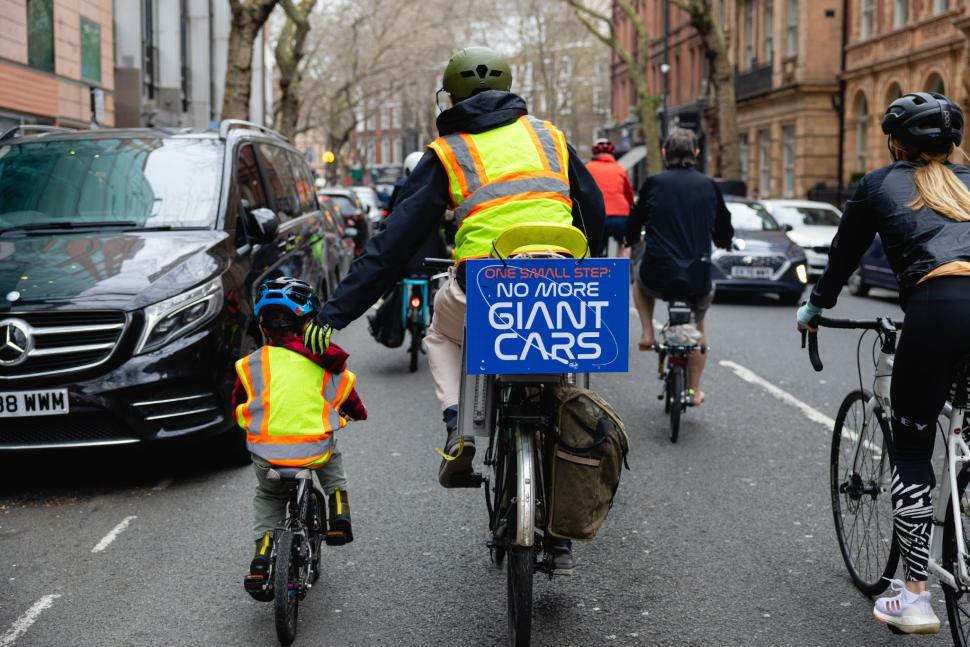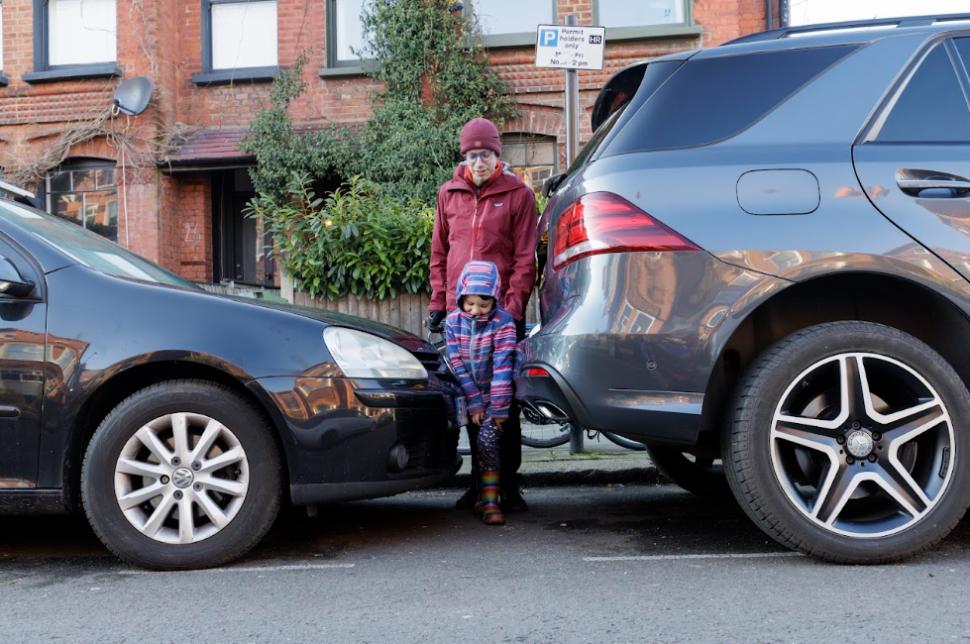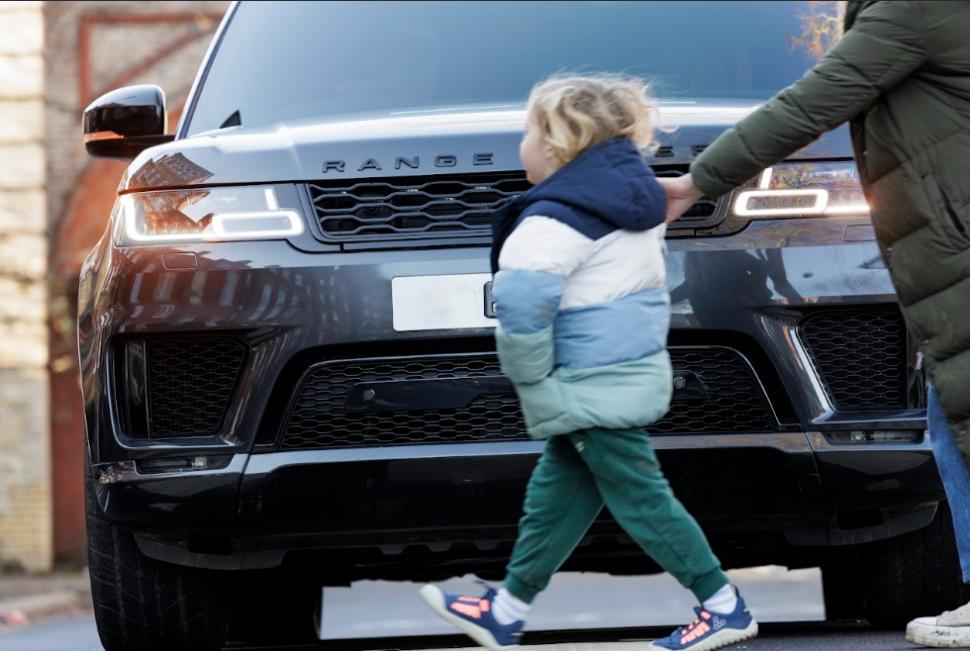- News
- Reviews
- Bikes
- Components
- Bar tape & grips
- Bottom brackets
- Brake & gear cables
- Brake & STI levers
- Brake pads & spares
- Brakes
- Cassettes & freewheels
- Chains
- Chainsets & chainrings
- Derailleurs - front
- Derailleurs - rear
- Forks
- Gear levers & shifters
- Groupsets
- Handlebars & extensions
- Headsets
- Hubs
- Inner tubes
- Pedals
- Quick releases & skewers
- Saddles
- Seatposts
- Stems
- Wheels
- Tyres
- Tubeless valves
- Accessories
- Accessories - misc
- Computer mounts
- Bags
- Bar ends
- Bike bags & cases
- Bottle cages
- Bottles
- Cameras
- Car racks
- Child seats
- Computers
- Glasses
- GPS units
- Helmets
- Lights - front
- Lights - rear
- Lights - sets
- Locks
- Mirrors
- Mudguards
- Racks
- Pumps & CO2 inflators
- Puncture kits
- Reflectives
- Smart watches
- Stands and racks
- Trailers
- Clothing
- Health, fitness and nutrition
- Tools and workshop
- Miscellaneous
- Buyers Guides
- Features
- Forum
- Recommends
- Podcast
news
 "No more giant cars" (credit: Clean Cities)
"No more giant cars" (credit: Clean Cities)Active travel campaigners call for higher taxes on “supersized” SUVs to tackle “carspreading”, claiming they are more dangerous to cyclists and pedestrians and cause more pothole damage
Active travel campaigners from the UK are calling for higher taxes on the owners of “supersized” SUV to tackle the phenomenon of “carspreading”, pointing out that academic studies show them to be more dangerous to cyclists, pedestrians, and smaller car users, as well as causing more pothole damage while also being unable to fit in most parking spaces.
A YouGov survey conducted in January found that only 18 per cent car owners in Britain held the belief that there shouldn’t be any additional charges on SUV owners. Clean Cities, a European active travel organisation campaigning for healthy and climate-friendly transport, has pointed to this study to demand changes in the current auto taxation system.
Its researchers found that since 2021, around 4.6 million cars have been sold in the UK, which were bigger than a typical urban car parking space — more than 1.2 million a year, with SUV sales figures pointing upwards.
“Supersized” SUVs, which the campaign described as being either more than 1.8m wide or 4.8m long, have been growing in popularity despite them crowding out space in towns and cities, causing more road wear and being more likely to cause fatal injuries for children, cyclists and those driving smaller cars.
> SUVs more dangerous to cyclists than other cars, study suggests
It claimed that if you were to add up just the extra length and width that overhanging SUVs take up, it would stretch for over 192 miles, the equivalent of driving from London to Leeds.
Oliver Lord, UK Head of Clean Cities, said: “Cars are getting bigger every year — while our streets are not. We need carmakers to prioritise normal-sized cars that can be parked more easily and are less dangerous to people walking around. It’s only fair if you want to buy a massive SUV that you should expect to pay more for the space it takes up.”
To tackle the phenomenon known as “carspreading”, the campaigners are calling for fairer taxes in favour of lighter and more appropriately sized cars and for parking costs in cities to be based on the size of a car.
A new academic paper, published earlier this week, shows that heavier cars are more likely to be involved in fatal collisions, and average car weight in the UK is increasing.
This may lead to a rise in fatal collisions if the trend continues, the academics warn. Reducing car weight could mitigate the severity and frequency of collisions, while academics suggested that policymakers could consider “taxation on heavier cars” and that “local authorities could adjust parking policies to charge higher fees for heavier cars”.
The study, led by civil engineer Ruth Carlson and co-authored by Nima Dadashzadeh, assistant professor in transport and business analytics at the University of Huddersfield, is based on preliminary findings with the full paper out later this year.
> SUVs 'eight times more dangerous' to kids walking or cycling than smaller cars are
New taxes could reap significant rewards for HM Treasury and the Department of Transport. As well as the additional revenue, discouraging sales of heavier cars could reduce road maintenance costs.
According to ‘the fourth power law’’, a formula developed by US Highway Officials, the damage done by a vehicle to a road surface is proportional to the fourth power of its axle weight.
A two-tonne SUV therefore does 16 times more damage than a one-tonne car. The potholing of road surfaces is even worse when it rains because heavier vehicles create much stronger hydraulic pressure, forcing water into any flaws and breaking up the road surface.
Harriet Edwards, a concerned parent from Sutton, said, “It’s not just the added stress of not being able to find somewhere to park, it’s the sense that if I’m involved in a collision with one of these giant SUVs, that me and my family are far more likely to be seriously hurt or killed.
“If you cause more danger, create more potholes and take up more parking space, it’s only fair that you pay a little bit more.”
Figures from the RAC show drivers encounter an average of six potholes per mile in England and Wales and the cost of pothole damage to vehicles is around £500 on average, with more severe repairs costing considerably more. According to the AA, fixing potholes is a priority for 96% of drivers.
Edmund King, the president of the AA, is on record as saying: “Better maintenance of the road network is the number one concern of drivers as damage costs a fortune and potholes can be fatal for those on two wheels.”
According to the YouGov polling, 61 per cent of UK passenger car owners agree that “SUVs take up too much space”, while only 19 per cent disagree. Further, 71 per cent of car owners also agree that SUVs make parking more difficult, while only 15 per cent disagree.
A 2023 study from the US also found that SUVs are causing more cyclist injuries, with crashes with SUVs resulting in 55 per cent more trauma and 63 per cent more head injuries than crashes with cars, owing to taller front-end designs.
A year prior, another US study showed that SUVs are eight times more dangerous to kids walking or cycling than smaller cars are. It also found that although SUVs are involved in much fewer crashes than standard cars, they are twice as fatal.
Adwitiya joined road.cc in 2023 as a news writer after completing his masters in journalism from Cardiff University. His dissertation focused on active travel, which soon threw him into the deep end of covering everything related to the two-wheeled tool, and now cycling is as big a part of his life as guitars and football. He has previously covered local and national politics for Voice Cymru, and also likes to write about science, tech and the environment, if he can find the time. Living right next to the Taff trail in the Welsh capital, you can find him trying to tackle the brutal climbs in the valleys.
Latest Comments
- Tom_77 45 min 18 sec ago
The SaddlePod looks nice, but if you're in the UK by the time you've paid shipping ($31) and import duty (who knows where we'll be with that come...
- VIPcyclist 46 min 34 sec ago
Instantly on the discounted list due to the ridiculous price.
- TheBillder 48 min 45 sec ago
I've had (past tense is deliberate) 3 of these over the past 5 years. I'm back here researching for a replacement as my last one broke last week. I...
- Steve K 2 hours 32 min ago
A very good family friend had worked at the Department of Transport. He told me when I had that car, that they'd done a study at one stage about...
- chrisonabike 2 hours 50 min ago
And the next time - plead sympathy for your addiction, caused by trauma from your previous "accident"...
- wtjs 2 hours 53 min ago
Butyric Acid... was the most disgusting thing I have ever smelt in the lab...
- ubercurmudgeon 3 hours 24 min ago
Even a stopped clock, etc, etc...
- Bigtwin 4 hours 45 min ago
I wouldn't be meeting that Orange Pillock anywhere, let alone 1/2 way.
- Laz 5 hours 1 min ago
If the local police is unwilling or unable to do their job properly, then perhaps her insurance provider ought to re-evaluate the risks she poses...



Add new comment
48 comments
What a load of crap here. Whoever thinks that people does not need big car, I'm afraid it's not for you to decide. If you think that there is more suv than hgv well you will be surprised how many hgv's there is on the road. By the way how many times I could see cyclist riding through red light just because they can is unreal, but well blame suv's for it or other cars.
Thanks for the warning, but it's redundant.
Size is relative so Kei car and truck drivers will be pointing at almost everyone in Europe though...
That one seems so stupid and terminally illiterate, it must be an ironic spoof account
You'll find that every society makes overt and covert rules about what is "need" vs. "want" vs. "thou shalt not" - which is not entirely linked to practical considerations on a single level. So that's always a question.
Perhaps they didn't "need" to travel, or not in that way? Maybe society as a whole "needs" vehicles more like the size shown in the picture rather than vehicles which primarily (initially) allowed US manufacturers to avoid taxes and also upsell consumers on vehicles which generated more profit despite being less practical for almost every conceivable purpose (except display)?
The 18 there, is that the age, the IQ, or both?
A lot of large SUV drivers seem to be large. Maybe owning a large, wide car makes them feel smaller.
The w@nkpanzer tax
Take a minute to watch cars go past.
MOST have just 1 person - even the huge cars
"Cycle infra is a waste of space, I rarely see any cyclists there" tho...
My son really didn't want to go to school this morning. We managed to get him to go, but as he was running late I said I'd take him on the GSD. We would have made it in time, except we got stuck behind a Range Rover struggling to squeeze down a residential street with cars parked (and in the process of parking/dropping off) on either side of the road. But, of course, it's only ever cyclists who hold up drivers...
LOL , me too the other day, I was on my GSD and got stuck behind a Cadillac Escalade (I think that is what they are called). It was so fat and over sized it couldn't get down Highgate West Hill without stopping and squeezing past every passing vehicle. And then a single decker bus came up the hill.
I've actually given up taking most of my backstreet shortcuts in Kensington and Chelsea because it's better than 50-50 odds that you'll come up against someone in a wankpanzer inching down the street at 5 mph desperately trying not to scratch their precious. As I suggested elsewhere, width restrictions at the entry/exit point of narrow streets would do a lot to stamp out this madness and definitely make people think twice about buying them.
Ah, but refuse trucks / fire engines / ambulances ... oh and the single disability- adapted vehicle on the block (like in the Bristol LTN case).
Ergo we can't restrict a substantial minority essentially taking the mick / doing what humans always do (conspicuous consumption) and which some companies are always keen to make possible (upselling people on stuff that has that as it's primary purpose and who cares about more widely distributed negative effects).
Introduce a large car specific driving test that's harder to pass, requiring more training and a requirement to have a specific large car licence. Actively enforce parking within marked bays.
"A new academic paper(link is external), published earlier this week, shows that heavier cars are more likely to be involved in fatal collisions..."
should be
"A new academic paper(link is external), published earlier this week, shows that DRIVERS OF heavier cars are more likely to be involved in fatal collisions..."
"A 2023 study from the US also found that SUVs are causing more cyclist injuries..."
should be
"A 2023 study from the US also found that DRIVERS OF SUVs are causing more cyclist injuries..."
Or be consistent and make it read: "A 2023 study from the US also found that SUVs are causing more BICYCLE injuries..."
No humans involved, nothing to worry about.
I'd like to see limits set for vehicle power. For instance a 5-seater vehicle is limited to 100 kW (135 PS/BHP). This would make large and heavy vehicles slower and safer as well as reducing environmental impacts.
And as a recent report in the Guardian showed, a million cars a year are sold in the UK that are too big for standard parking spaces. Back in the seventies, we called it conspicuous consumption, flaunting your wealth and arrogance. Tax the pips till they squeak: and then a lot more.
https://www.theguardian.com/environment/2025/apr/04/more-than-1m-cars-so...
My EV estate is over 4.8m and is wide.
and is wide.
I didn't want it to be that big, I just wanted an electric version of my previous estate.
You know you could have bought a smaller car, right? Other cars are available.
My EV exceeds the size. It's the smallest vehicle available which can transport my wife's trike (excursions or rescue).
Which means that even SUVs are a minor issue, it's construction vehicles, HGVs and buses that disintegrate roads.
Except that there are a lot less of those than there are SUVs. And they're generally closer to 'enough vehicle for the purpose', as opposed to the SUVs, which are mostly 'more car than is necessary'.
(Though reducing reliance on HGVs, particularly in urban areas, would be great too.)
So, do those buses do as much damage per person as a w@nkpanzer?
Given that the usual formula for road damage is proportional to axle weight to the fourth power - they do a lot more damage per person.
Even comparing with a bus packed full of people and a single-occupancy SUV.
Heavy cars certainly don't help. And not all roads carry buses. I do now notice the impressive damage to roads at well-served bus stops though.
I don't believe that additional taxation is going to make a huge amount of difference for many SUV devotees; someone who can afford £100,000 plus on a Range Rover or a Porsche Cayenne probably isn't going to be that bothered by a few quid extra in tax. The solution is surely to make them impractical and inconvenient to use; ban non-commercial vehicles over a certain size from using municipal car parks and on-street parking spaces and introduce width restrictions in appropriate areas and refuse to issue residential parking permits on the streets below a certain width and people would soon start looking for smaller vehicles.
Absolutely. Since sumptuary laws have a spotty record and making stuff unfashionable is a tricky business, we'll have to go with interventions like you suggest.
Wait - why don't we make our streets narrower?
What's that? People say they're already "too narrow" for pavements or cycle space? 😢
That's a good point.
I dunno. If a lot of these SUVs are bought on finance, then proportionately an extra £300 per month in VED, or whatever, might sway things, but perhaps less than a change in the car financing market.
(I have heard the car financing marking described as 'the next sub-prime crash' because there is so much potential bad debt there. This might have a bigger impact on the growth of cars than anything else.)
Pages